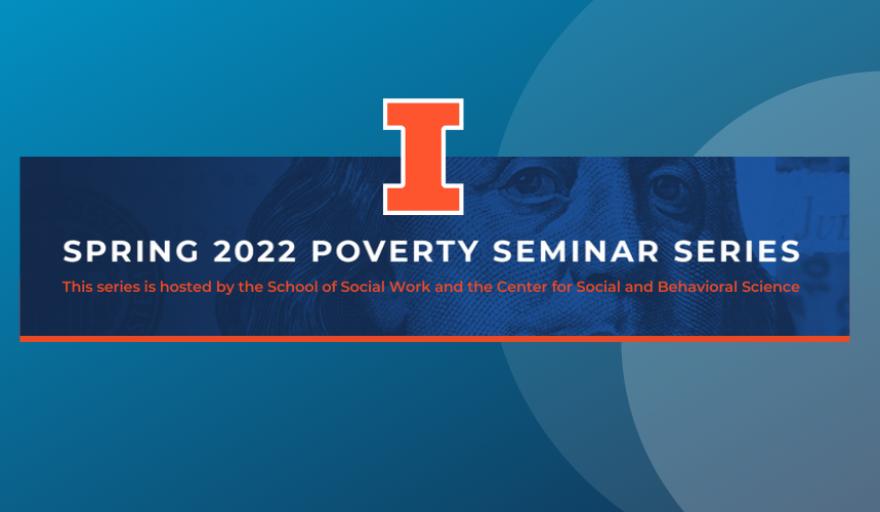Spring Poverty Seminar Series
January 13, 2022

Spring Semester Speakers
Spring Semester, 3rd Friday, January – April
12-1:30 p.m.
The School of Social Work, in partnership with the Center for Social and Behavioral Science, is pleased to invite you to our virtual Spring 2022 Poverty Seminar Series.
This semester’s talks will focus on poverty reduction via cash transfer programs. During this seminar series, faculty from various disciplines will present their research on program implementation and evaluation and will provide insights on how unconditional cash transfers can affect child development, poverty alleviation, housing, and economic opportunity. Following the speakers’ research presentation, participants will have the opportunity to engage in a Q&A.
Registration is open to all. We encourage you to submit questions in advance via the registration form.
This event is open to the public and there’s no cost to attend.
Register now
Meet the Speakers:
Dana Kelly
Senior Policy Advisor
Illinois Department of Human Services
Date: Friday, April 15
Time: noon-1:30 p.m.
All In Illinois: Reducing Deep Poverty in Our State
The commission was established under the Intergenerational Poverty Act in June 2020 and is tasked with issuing a strategic plan for accomplishing a 50% reduction in deep poverty in Illinois by 2026, the elimination of child poverty in Illinois by 2031, and the elimination of all poverty in Illinois by 2036. The commission’s initial strategy focuses on the first statutory goal, reducing the number of people living in deep poverty by half. The plan is organized around five strategic pillars: ensuring Illinois is the best in the nation for raising families; stabilizing homes and communities; ensuring just and equitable access to economic security programs; addressing barriers to paid work, education and advancement; and supporting trusted community based providers to serve the needs of those in deep poverty. The commission’s strategy is an important step in acknowledging what it will take to end systemic, intergenerational poverty in Illinois.
Previous Speakers:
Daniel Brisson
Professor, Graduate School of Social Work
University of Denver
Friday, March 25
Time: noon-1:30 p.m.
“The Denver Basic Income Project (DBIP): Learning at the start of a guaranteed income project”
The Denver Basic Income Project (DBIP) was an idea initiated by Mark Donovan, A Denver Based Entrepreneur, to provide guaranteed income to people experiencing homelessness in Denver. Our team has been building out the idea and plan to deliver DBIP to 820 people experiencing homelessness in Denver, CO. Guaranteed income is an exciting anti-poverty idea, and it is an idea with many challenges to overcome. The first half of this seminar will review the idea of DBIP and the design for studying it. Then, we will use breakout groups and a large group discussion to assess and critique the idea. Then, with the remaining time we will go through early learnings from DBIP with a focus on three topics: 1) the need for a program and strong community partnership; 2) Results of a process evaluation of a pilot launch; and 3) Qualitative summative results from a ten-person pilot.
Stacia West
Associate Professor, School of Social Work
University of Tennessee Knoxville
Date: Friday, February 18
Time: noon-1:30 p.m.
“Guaranteed Income: What do we know and what is left to learn?”
Dr. West’s presentation will focus on the design, implementation, and first year findings of the Stockton Economic Empowerment Demonstration. She will also share details about the numerous guaranteed income pilots that have recently launched across the US, including important lessons learned regarding implementation, disbursement mechanisms, and the potential for bringing guaranteed income to scale.
Greg Duncan
Distinguished Professor, School of Education
University of California Irvine
Date: Friday, January 21
Time: noon-1:30 p.m.
“The causal impact of poverty reduction on infants and their families.”
Early childhood poverty has long been associated with school achievement, educational attainment, adult earnings and, more recently, functional neural development. Two family-process pathways have been proposed – a “what money can buy” path consisting of the child enrichment and other time and money expenditures made by parents on behalf of their children, and a “stress” pathway that operates through parental mental health and parenting sensitivity. Unclear in these mostly correlational studies is whether poverty causes developmental and family process differences early in life. The seminar will describe early results on infant EEG power from a randomized control trial (RCT) of poverty reduction. Participants were 1000 mother-infant dyads who enrolled in Baby’s First Years, the first randomized control study of poverty reduction in early childhood in the United States. Mothers and their infants were recruited in hospital maternity wards in four U.S. metropolitan areas (New York City, the greater New Orleans metropolitan area, the greater Omaha metropolitan area, and the Twin Cities of Minneapolis and St. Paul). Shortly after giving birth, mothers were randomized to either a “high-cash gift group,” receiving $333/month, or a “low-cash gift group,” receiving $20 per month. The presentation will focus on group differences (i.e., treatment effects) on EEG-based outcomes and mediators as well as possible policy implications of these differences.